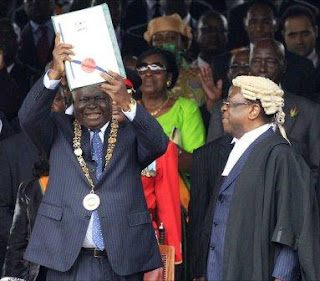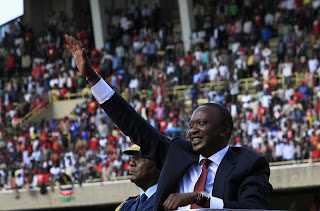Kibaki’s Legacy: Development oriented president
 When President Mwai Kibaki said he was retiring whether he
it was a constitutional mandate or not he meant it. With a remarkable
development record that many founding fathers in Africa missed at independence,
Mwai Kibaki, an economist trained at East Africa’s Oldest University, Makerere University
Kampala is headed for retirement if the March 4th general election
produces a winner on the first round. History will judge the devoted leader who
according to political analysts says he did not embrace party politics but was
committed to delivering what he promised Kenyans on 30th of December
2002.
When President Mwai Kibaki said he was retiring whether he
it was a constitutional mandate or not he meant it. With a remarkable
development record that many founding fathers in Africa missed at independence,
Mwai Kibaki, an economist trained at East Africa’s Oldest University, Makerere University
Kampala is headed for retirement if the March 4th general election
produces a winner on the first round. History will judge the devoted leader who
according to political analysts says he did not embrace party politics but was
committed to delivering what he promised Kenyans on 30th of December
2002.
Sworn on a wheelchair president Mwai Kibaki, has exhibited
political maturity and worked towards bringing equality to all by devolving the
diety provincial administration that Kenyans had earlier associated with
corruption and nepotism in service delivery. The Kibaki Legacy revolves around
the infrastructural development that includes rehabilitation of dilapidated
road networks, promotion of the real estate, upgrading of slums and access to
basic financial services across Kenya.
Despite the fact the president transformed the face of Kenya;
critics say the president disunited Kenya. It will be remembered what led to
the post elections violence after the disputed presidential polls in 2007,
where close to 1100 people lost their lives and hundred of thousands displaced
and property worthy millions destroyed which later scared away the investors
who had taken root in Kenya; was the accumulated ethnic tensions that came with
the multiparty democracy in 1991.
Today, Majority of Kenyans have access to better health care facilities, financial
services and devolved government agencies hence increased service delivery for
Kenyans of all walks of life. As president Mwai Kibaki walks home, Kenyans will
remain with the memories of the boss who remained silent when everyone was
talking, the president who never sacked ministers when they criticized the
government they served. He will be remembered not only Kenyans but also we, the
members of the press when he publicly spoke on the importance of freedom of the
media in a developing country like Kenya.
The media bill of 2008 that was given excessive power to
grant the minister in charge of media to storm any media house and confiscate
broadcasting material which He rejected.
When he took over the mantle of leadership from Moi,
prioritized the economy as the focus of his tenure, the Kenyan economy was
struggling at 0.6 per cent.
Kenyan economy was heading south from 4.5 per cent in 2001
to an all time low of 0.6 in 2002 and later on it registered a massive change
before the 2007 general election where it had hit a high of 7.1 per cent. With
the stable economy Kibaki’s administration introduced programmes that supported
the youth and empowered women in to the creation of wealth to suppress the
debts his predecessor had created during his 24 year tyrannical rule by an iron
fist.
During the Jamhuri day celebration last year, Kibaki
revisited all his achievement for the 10 years he had been the chief executive
officer of Kenya.
During his regime the sectors that massive saw recovery
include infrastructure development, increased tax revenues, financial
inclusivity and development of Information Communications Technology.
Free primary education saw over ten million children having
access to basic education it led to the transition rate from primary to
secondary school dramatically rise from 42 per cent to over 70 per cent.
His government revived the agricultural sector by registering
a growth from low of -3 per cent to 6 per
cent in the past ten years adding that poverty levels have also gone down from
56 to 46 per cent. With the achievements has seen Kenyans fund their own budget
up to 75% compared with the embattled Moi’s regime that was marred by
corruption and misappropriation of public resources.
The Vision 2030 economic blueprint, which replaced the
Economic Recovery Strategy for Wealth and Employment Creation in 2007, seeks to
transform Kenya into a newly industrialised, middle-income nation that provides
a high quality of life to its citizens by 2030. Envisaged by performance
contracting the government has restored public trust to government offices that
has led to change in the way Kenyan live.
It’s surprisingly how one gets a passport in less than 30
minutes without bribing or paying any extra charge for the same.
As Kibaki walks home to his village in Othaya constituency
in Nyeri County, he goes to a rural home with electricity supply, not only to
his home but also to the neighbourhood. Through the establishment of the state
corporation REA (Rural Electrification Authority), Electricity connections
increased to 2.11 million connections as of 2012 from 686,195 in 2003 when he
took over. In 2002 only 10 energy centres supplied power in the country and
these have been increased to 15 including Lodwar, Garissa and Marsabit.
Towards the end of 2011 the installed capacity stood at
1,534 megawatts as compared to 1,142 megawatts at the end of 2002.
When the president came to power, some basic state
corporations were incapacitated to offer services to the people in a pro
efficient manner. To solve this issue the government initiated a public-private
partnership that saw the government begin a massive privatization programme
that touched across all unperfoorming state corporations. Privatization of
Telkom Kenya limited saw the company return to its central role of offering
internet connectivity to its subscribers at a low cost. Other sectors which
were privatized include the Kenya railways which sold its investments to the
Rift Valley railways and maintained its role of maintaining the infrastructure
hence promoting efficiency in the railway transportation.
As Kenya prepare to celebrate the jubilee to mark 50 years
of independence, it would be important to revisit the three goals set forth by
our founding fathers which were based on disease, ignorance and poverty. As for
the president he has from time to time asked Kenyans to do something in order
to make Kenya a working nation as it plays its central role of being an
economic leader within east and central Africa that make the great lakes
region.


Comments
Post a Comment